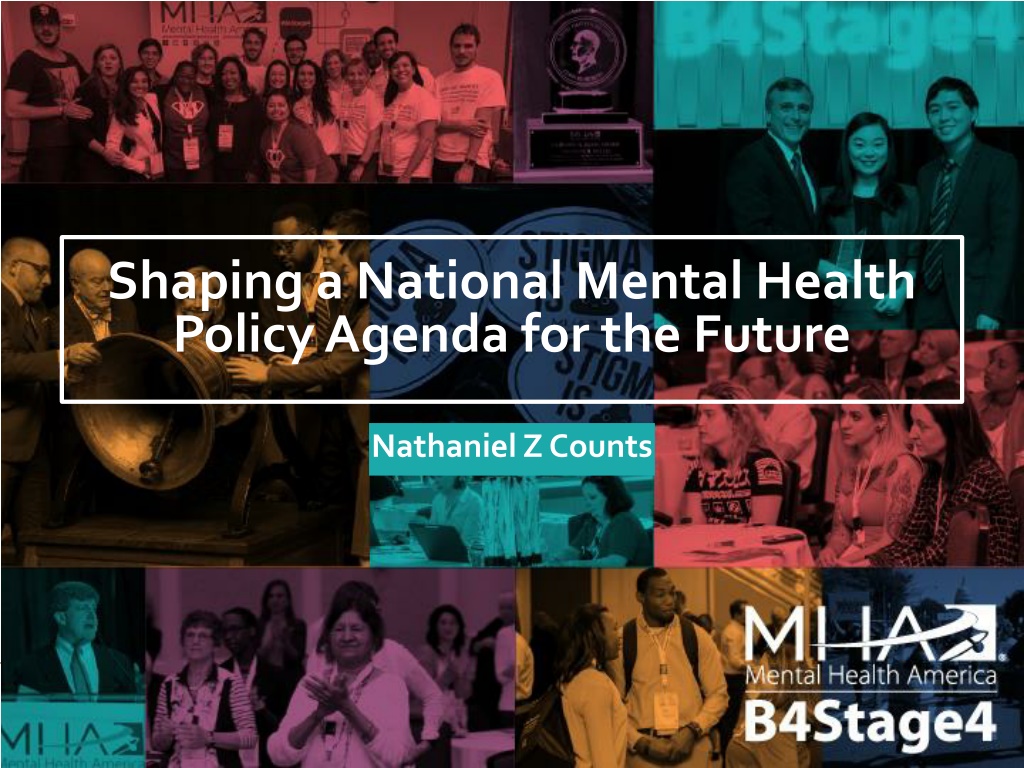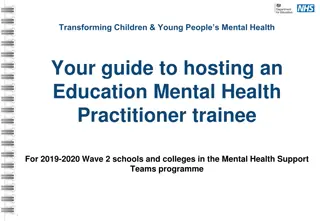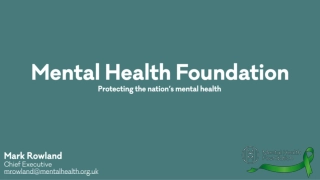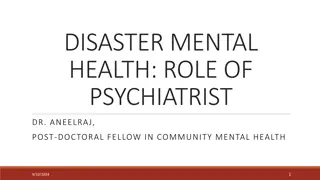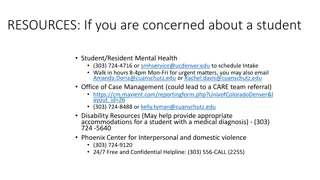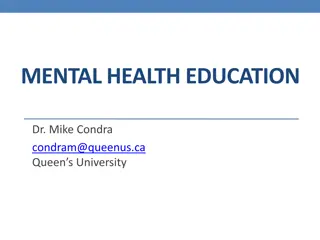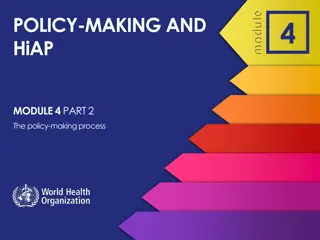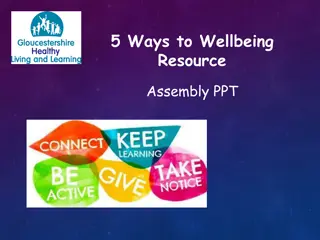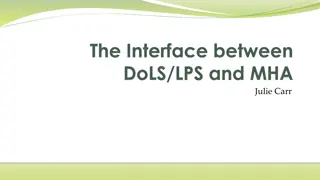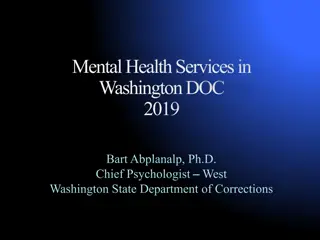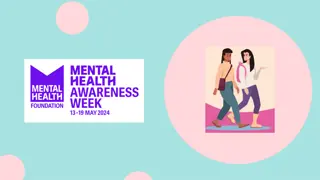Shaping a National Mental Health Policy Agenda
This presentation discusses the importance of mental health as a critical component of overall wellness. It emphasizes prevention services for all, early identification and intervention for at-risk individuals, integrated care and support services for those in need, with recovery as the ultimate goal. The content explores the advancements in technology and research over the past century that can be utilized to achieve mental health policy goals for the future.
Download Presentation

Please find below an Image/Link to download the presentation.
The content on the website is provided AS IS for your information and personal use only. It may not be sold, licensed, or shared on other websites without obtaining consent from the author. Download presentation by click this link. If you encounter any issues during the download, it is possible that the publisher has removed the file from their server.
E N D
Presentation Transcript
Shaping a National Mental Health Policy Agenda for the Future Nathaniel Z Counts
2 MHA s Mission Promote mental health as a critical part of overall wellness, including: Prevention services for all; Early identification and intervention for those at risk; Integrated care, services, and supports for those who need it; with Recovery as the goal.
5 How do we make sure in another hundred years, we don t uncover our policy priorities and realize we re still working on the same things?
6 What s Different Today? We have a century of research about how to do these things! We have technology We can collect outcomes We can deliver interventions We can connect people March of social change and better research on how it happens We also have bright spots
7 How do we use these advances to achieve MHA s goals?
8 Creating a National Policy Agenda What specifically do we want to happen? How does change happen? How do our changes happen? What needs to change? How do we change them?
9 What specifically do we want to happen? Visualizing the actual changes in human behavior Prevention: A woman is pregnant/baby is born Early intervention: Child has warning behaviors Integrated care: Person screens positive for MH condition Recovery: Individual experiencing homelessness
10 What specifically do we want to happen? Prevention: Everyone gets effective interventions at critical developmental periods Early intervention: Everyone gets screened regularly, those with need get services Integrated care: When you get care, you get everything you need in a coordinated fashion Recovery: Services focus on social functioning and what matters most to individuals
11 How does change happen?
12 Lessons Learned in Change Rosie D Collaborative Care Model Depression quality measurement
13 Case Studies for Change We have a pediatrician that looks at height and weight for young children but not behavioral health. What would it take for them to change? We have a parent that believes in harsh discipline and authoritarian parenting. What would it take for them to change? We have an employer that discriminates against individuals with mental health conditions. What would it take for them to change?
14 Why Do People Change? Two Parts: Do they know what to do? Are they motivated to do it?
15 Prochaska Stages of Change Model http://socialworkpodcast.blogspot.com/2009/10/prochaska-and-diclementes-stages-of.html
16 Behavioral Econ Perspective Do they know what to do? Need to expose individuals to models of desired action e.g. classes, media, leaders Are they motivated to do it? Altruistic/cooperation incentives Financial/material incentives Reputational incentives
17 Improvement Science/Learning System Perspective https://deming.org/explore/p-d-s-a
18 How do our changes happen?
19 For Before Stage 4 Who needs to change? What do we need them to do? How can we produce that change?
20 Who needs to change? Health care providers? Education providers? Local governments? Employers and landlords? Whole communities? Yes.
21 What do we need them to do? Know the evidence-based next step to improve the mental health of those around them, given their role, or have a framework for innovating and improving Cooperate across community to maximize everyone s outcomes Contribute to shared learning and improvement
22 How can we produce that change? Training/media/leadership The right measures The right infrastructure for shared learning/cooperation The right incentives when individuals, collectively or alone, improve mental health outcomes, they should be rewarded, regardless of profession/affiliation
23 What needs to change?
24 How can we produce that change? Policy change to: Health care coverage and reform Health IT and related tech Funds for training/GME Harmonizing Incentives Promoting collective impact Funding community infrastructure
25 The Rest of MHA Also Contributes! Public education Leadership awards Media commentary S2S Partnerships
26 How do we change them?
27 MHA in Context https://www.opensecrets.org/lobby/top.php?indexType=s
28 What We re Doing Now Quality Measurement Parity Accreditation Peers in APMs ACH for Children and Families Net Present Value of Care
29 How Net Present Value of Care Works
30 How We re Doing It Building alliances with private sector Adding a line or two to a bill Focusing on technical regulatory changes Encouraging new bright spots Publishing in the academic literature
31 Ultimately Hope to change the rules of the game, rather than win Have an environment that repeatedly reinforces our changes Live in a better world where recovery is not only the goal, but the reality!
32 Discussion What are your reactions to this approach? Are there things you would add or change? What kinds of changes and strategies are you working on or interested in? Everything else!
33 Contact Nathaniel Z Counts, JD ncounts@mentalhealthamerica.net
